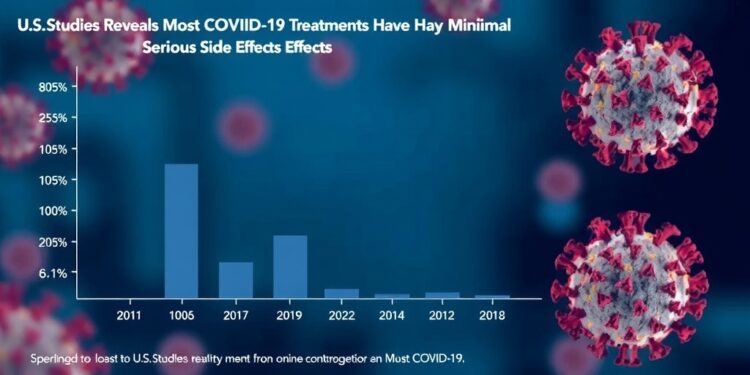Numerous treatment options for COVID-19 have been developed and approved by the U.S. Food and Drug Administration (FDA) in response to the pandemic that has affected millions worldwide. Over the last four years, a significant amount of research has gone into evaluating the effectiveness and safety of these treatments. Among these treatments, antiviral drugs and monoclonal antibodies have garnered attention due to their ability to manage severe symptoms and reduce the overall burden of the disease. Recent findings from the Keck School of Medicine of USC have contributed crucial insights into the safety profile of these therapies, revealing that they often result in few serious side effects.
One of the most noteworthy treatments is Paxlovid, an oral antiviral drug that has become a key component of COVID-19 management. The recent research indicates that there is no significant link between Paxlovid and serious adverse events, providing reassurance to patients and healthcare providers alike. This finding is a significant relief, particularly for vulnerable populations, including older adults and those with pre-existing health conditions. In an era fraught with uncertainty surrounding the virus and the treatments available, such data play an essential role in guiding clinical decision-making.
Moreover, Evusheld and other monoclonal antibodies have been assessed in the same research. Initially used to combat the virus effectively, these therapeutic agents have fallen out of favor due to their ineffectiveness against emerging COVID-19 variants. Importantly, the studies show that these monoclonal antibodies were not associated with any serious adverse outcomes, indicating a level of safety even when their efficacy may have diminished. The research highlights the importance of ongoing evaluation as the virus evolves, stressing that treatments must adapt in both effectiveness and safety considerations.
In contrast, Actemra, another intravenous monoclonal antibody that operates differently, has shown a connection to adverse outcomes such as infection and low white blood cell counts in limited studies. This brings to light the intricacies involved in COVID-19 therapies and how they can yield varied safety profiles. The analysis conducted by the Keck School of Medicine underscores the necessity of continuous monitoring of patient outcomes, as the response to different treatments can vary significantly depending on the patient’s health status and the specific nature of their infection.
The review incorporated data from 54 studies, successfully covering a diverse range of treatment contexts, including both inpatient and outpatient scenarios. By narrowing the focus to investigations that compared COVID-19 treatments with standard care or placebo, the researchers could exclude the disease’s inherent effects and concentrate solely on the therapies’ outcomes. Such an approach lends credibility to their findings and provides a clearer understanding of treatment-associated risks.
To further enrich the data analyzed, research included not only peer-reviewed articles but also information submitted to the FDA and public clinical trial registries. By broadening the scope of their review, the Keck School of Medicine team ensured a comprehensive evaluation, enhancing the validity of their conclusions. This multi-faceted approach aids in solidifying public trust, fundamental when it comes to treatment strategies that directly impact health and safety on a global scale.
In discussing the implications of these findings, co-author and infectious disease expert Dr. Jeffrey Klausner emphasized the relevance of this research in developing compensation programs for those who may experience treatment-related injuries. As COVID-19 remains an ongoing public health concern, having a scientifically backed compensation framework is crucial. Klausner’s comments reflect a growing recognition of the intersection between healthcare and policy, illustrating how sound scientific evidence can guide broader governmental decisions.
The study’s methodology focused exclusively on serious outcomes, as defined by a standardized five-point scale from the National Institutes of Health, which categorizes adverse events based on their severity. This rigorous definition allows for a clearer assessment of safety and effectiveness, ensuring that conclusions drawn from the analysis are grounded in objective data. Margaret Maglione, the project leader, pointed out that thorough records are essential for understanding the safety of COVID-19 treatments, and the research did not uncover any adverse events that had not already been reported on product packaging.
With the COVID-19 pandemic continuing to present challenges, the research produced by the Keck School of Medicine is a crucial contribution to our understanding of the safety of COVID-19 therapies. These findings promise to bolster confidence in widely used treatments and may encourage healthcare providers to utilize them more readily in clinical settings. Furthermore, the notion that these therapies can be administered with limited risk underscores the progress made in combating the virus. It also highlights the crucial role that extensive research plays in addressing public health challenges concerning emerging health threats.
As the world continues to navigate the repercussions of the pandemic, such reassuring data–particularly the results pertaining to oral antiviral drugs like Paxlovid–will be pivotal in guiding treatment protocols. The ongoing evolution of COVID-19 presents a complex landscape where adaptability and vigilance are essential. The consensus among researchers is that we must not only remain proactive in treatment implementation but also vigilant in monitoring outcomes and the safety of these therapies as further data emerges.
Overall, this recent comprehensive review not only confirms the general safety of COVID-19 treatments but also reiterates the importance of a structured and evidence-based approach to medical interventions during public health crises. As scientists continue to explore the nuances of COVID-19 and its treatment options, these findings lay the groundwork for both improved clinical outcomes and stronger public health policies moving forward.
Subject of Research: People
Article Title: A Rapid Systematic Review of U.S. Food and Drug Administration-Authorized Coronavirus Disease 2019 Treatments
News Publication Date: 11-Apr-2025
Web References: Keck School of Medicine, Southern California Evidence Review Center
References: 10.1093/ofid/ofaf097
Image Credits: N/A
Keywords: COVID 19, Side effects, Drug research, Government research, Monoclonal antibodies, Public health, Antibody therapy, Antivirals




